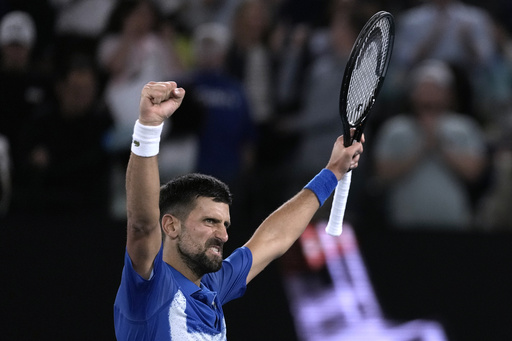MELBOURNE, Australia — Coco Gauff faced a challenging match at the Australian Open, where her revamped forehand and service game fell short at a critical moment. Throughout the match, she repeatedly racked up unforced errors, clumsy double-faults, and break points—leading her to express her frustration with gestures like covering her eyes or slapping her thigh. Ultimately, Gauff’s hopes of advancing further in the tournament were dashed as she lost in the quarterfinals to the 11th-seed Paula Badosa from Spain, with a final score of 7-5, 6-4.
Entering the season’s first major, Gauff, the reigning U.S. Open champion, had high expectations after adjusting her playing style and making changes to her coaching staff following a disappointing end to her title defense in New York the previous September. The 20-year-old quietly hoped to capture her second Grand Slam title in Australia.
Reflecting on her performance, Gauff remarked on her evolution since the U.S. Open, stating, “There was a lot more work to do.” Despite her disappointment, she expressed optimism about her progress, noting, “I feel like I’m on the road to the right way, right path,” and recognizing that the experience had given her clarity on areas for improvement.
As of Tuesday, Gauff had maintained an impressive record of 9-0 for the season, following a four-match win streak that culminated in her title at the WTA Finals in November. After the match against Badosa, which lasted 1 hour and 43 minutes, she acknowledged the need for continued improvement but emphasized she was not completely defeated.
On the other hand, Badosa advanced to the semifinals of a Grand Slam tournament for the first time at 27 years old. Just a year prior, she had contemplated retiring due to a persistent stress fracture in her back that underwent a lengthy recovery process and didn’t initially respond to treatment. “I wanted to give it a last try,” Badosa stated, appreciating her journey back to form alongside her team.
Badosa will face her close friend Aryna Sabalenka, the top-ranked player and defending champion, in the semifinals on Thursday. Sabalenka achieved a remarkable 19-match winning streak in the tournament, defeating Anastasia Pavlyuchenkova with a score of 6-2, 2-6, 6-3.
In the men’s draw, Novak Djokovic marked a significant career milestone, reaching his 50th Grand Slam semifinal as he seeks a record-breaking 25th major title. He overcame Carlos Alcaraz in a tense match that stretched over three and a half hours, ending just shy of 1 a.m. Despite dealing with a leg issue requiring a medical timeout, Djokovic reported feeling better later in the match thanks to medication provided by tournament doctors.
Djokovic is set to compete against second-seed Alexander Zverev on Friday, who secured his semifinal spot after defeating Tommy Paul 7-6 (1), 7-6 (0), 2-6, 6-1. Zverev demonstrated steadiness under pressure when Paul was within striking distance of winning both early sets before ultimately succumbing to Zverev’s strong performance in the crucial tiebreakers.
A year ago, Badosa had to pause her career due to her back injury and expressed her frustrations with finding a resolution at that time. However, the changes she made—involving new medical support, fitness coaching, and nutrition—finally paid off as she managed to regain her form. “The puzzle started to look better,” she concluded.
During her quarterfinal, Badosa maintained relentless pressure on Gauff, who concluded the contest with a staggering 41 unforced errors, including six double-faults and a staggering tally of 28 misfired forehands. Badosa seized the opportunity to convert four out of ten break points against Gauff’s serve. The turning point came early in the second set, where Badosa converted the fifth break point after Gauff struggled with consecutive forehands.
As Badosa sealed her victory, she displayed a wave of emotion, kneeling and bowing her head while placing a hand over her mouth. This moment was significant for her, given her previous peak ranking of No. 2 in 2022, and only now feeling she is tapping into her full potential. “I’m always like this. It’s my personality. It’s my character,” she said, alluding to her desire to win the tournament as the ultimate source of her freedom.




